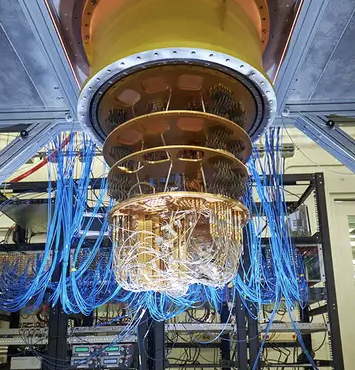2022-10-01 –, apfel
Language: English
What exactly is a quantum computer and, if you had access to one, what would you do with it? Crack cryptographic systems? Optimize traffic routing in cities? Build better search engines? Design super-efficient batteries? Vastly improve climate models? The benefits of quantum computers, like most advanced technologies, will depend on who controls them and for what purpose.
In 2021, $3.2 billion was invested in quantum firms around the world, up from $900 million in 2020. Nerds and geeks at Google, IBM, Amazon, Honeywell and at least 600 startups are working overtime on cryostats, trapped ions, silicon quantum dots, and diamond vacancies. What technology wins and when remains unclear. The goal is to achieve ‘quantum advantage’ -- to build computers capable of solving problems far beyond the reach of existing machines. Much is possible: new materials designed for battery storage resulting in dramatic reductions in charging times for electric vehicles (make charging an EV as fast as pumping gas); real time or near real time optimization of complex energy grids with massively distributed supply and demand nodes; optimizing the global transportation infrastructure for liquified natural gas; and transportation management of multi-modal mobility systems in complex urban environments. And, maybe, say some experts, these tasks could that be accomplished with far less energy. In Germany, the existing large and small data centers consume almost 3% of total electric consumption — roughly the same as the entire city of Berlin. But who will have access to quantum computing capacity and for what purpose? What is feasible and in what timeframes? I will present the results of a study funded by the Internet Society Foundation that takes a deep dive into the future of quantum computing and its implications for our environment.
I work at the intersection of new technologies and public policy -- assessing the risks/benefits, exploring governance options, examining public perceptions, and improving communication strategies.

